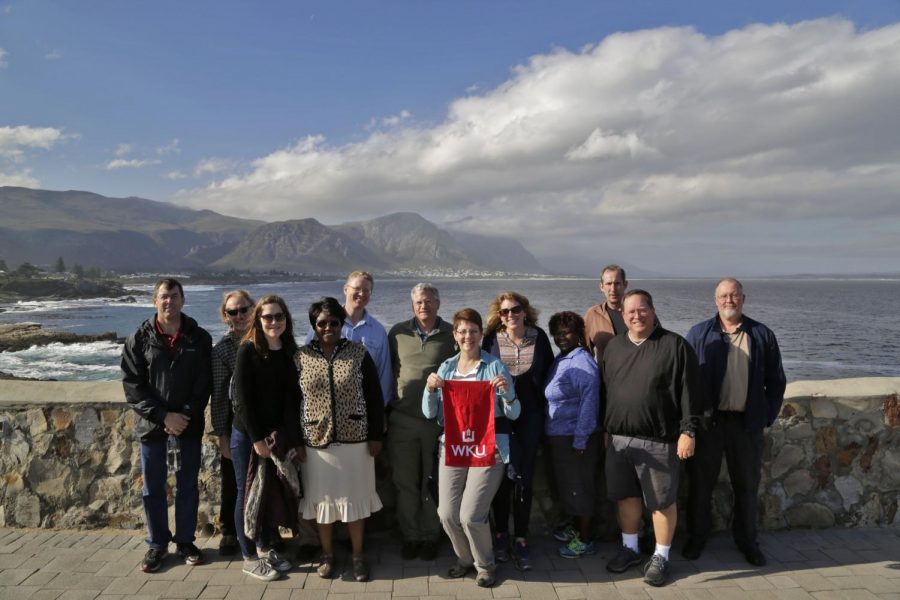Student, faculty give back after South Africa trip
November 10, 2015
WKU students are encouraged to participate in cultural awareness programs and study abroad to obtain a global learning experience. Every year, this cultural awareness is brought to the school through the International Year Of program, which is highlighting South Africa.
Over the summer, a group with the Zuheir Sofia Endowed International Faculty Seminar travelled to South Africa to collect material to bring back for the program.
“Essentially, the ZSEIFS functions as a study abroad program for faculty,” said Katherine Paschetto, the programming coordinator of WKU’s Office of International Programs. “The goal is to deepen participants’ understanding of and connection to the country so that they can impart that new knowledge to their students during the subsequent IYO and for years to come.”
ZSEIFS is incorporated into IYO, a program in its second year, which is designed to connect students on campus with cultures from around the world by featuring a single country throughout each school year.
“This program is designed to give the WKU campus and surrounding community a deeper and more nuanced understanding of the world around them,” said Paschetto. “The IYO program strives to both seed and foster global awareness, intercultural sensitivity and intellectual curiosity.”
During the summer trip, Tyler Essary, a senior from Prattville, Alabama and the Herald’s multimedia editor, was able to experience the culture and landscape of South Africa with 11 faculty members.
“It was almost like two countries in one. Half of it was like Southern California. The other side of the road was townships, like shantytowns,” he said.
After spending time documenting each side of life in South Africa, Essary wanted to do something to help the children and families he met in the townships.
Essary decided to use his photos to create a gallery, currently on display in Spencer’s Coffee. The project is titled “After Apartheid” and provides viewers with a meaningful glance into what life is like in the South African townships. Each photograph on display is available for purchase.
All proceeds will go to Masinyusane, a nonprofit that works to meet the needs of families in South African townships. The organization places a particular emphasis on providing children with education that will open up opportunities to help them succeed in life.
“It was really important for me to do the photo gallery because I wanted to give back. The people were so inviting, so welcoming,” Essary said. “I would love to go back and do more hands-on service.”
Masinyusane believes an important answer to the problem of poverty in townships is education.
“The schools in the townships are appalling,” said Jim McKeown, the executive director of Masinyusane. “Couple that with impoverished communities and the HIV/AIDS pandemic, and you have the disaster that we now experience.”
The organization works to give impoverished children opportunities that will allow them to overcome these challenges.
“I’ve always felt very strongly about trying to do something about global poverty,” said McKeown. “It’s immensely unfair that where a child lives sometimes determines if they live or even how they end up living.”
Many members of the ZSEIFS South Africa team returned with goals to make a difference on a global scale.
“Since returning from South Africa in June, not only have those faculty been adding new content to courses they teach on a regular basis, but they have also been pursuing other projects independently and collaboratively,” said Paschetto. “Two faculty members made connections with elementary schools in South Africa during the ZSEIFS and have now implemented a sister school program that will connect several elementary schools in the Bowling Green area with schools in South Africa.”
Paschetto said another faculty member started a long-term research project in South Africa and is applying for a Fulbright award so she can return to her work there.
“I think that in a world that’s becoming smaller due to technological advances and the ease of information exchange, achieving these global competencies is becoming increasingly important,” Paschetto said, “regardless of age and educational or professional aspirations.”
WKU’s global outreach does more than just teach Hilltoppers about different cultures; it creates international connections that can change the lives of both students and people around the world.












